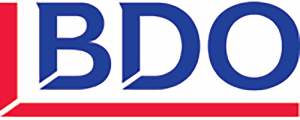I went to university with little idea of what I would end up doing. I studied Sports and Exercise Science at Essex University, which is a far cry from accountancy, but I’m a numerate person and excelled at mathematical subjects.
What’s a typical day?
A typical day as an audit trainee at BDO involves client meetings, maintaining client relations, reviewing, testing and preparing client accounts, analysing and cross-checking financial details. I am constantly networking and have been lucky enough to represent BDO at events. I’m in a role which has clear progression, offers variety and is challenging. I am constantly learning about how businesses operate and the skills I gain on a daily basis through work and study are invaluable.
Do you travel?
The job usually includes travelling to different locations with an average duration of two weeks. As an auditor you’re never in the same office for too long, particularly in a mid-tier firm, where the majority of the clients are mid-market companies.
I get exposure to a wide range of clients, from multiple sectors, listed companies, independently-run firms and a multinational specialist. I use the knowledge I gain during studies, as well as experience with clients, and apply it, in a different way, to each audit. No client is the same; they require different approaches. This makes for an interesting working day. BDO is an excellent place to work and to learn about the accounting profession, as I’m surrounded by experienced and motivated work colleagues.
What was the application process like?
Applying was very straightforward – I applied via the BDO website. They informed me in a couple of days that my application was successful and therefore I was able to sit my online tests. They were quick and similar to previous verbal reasoning and numerical tests I had completed.
A few days later I heard that I had passed the tests and I was invited for interview. The dates were flexible in case I couldn’t make it. The first interview lasts about an hour. I received an email by the time I got home from the first interview to say I was successful and inviting me to the next stage (the assessment centre). The assessment day was competitive but also fun and the people I met through the process made me feel very relaxed. I received the call later the same day to inform me I had got the job.
My advice is, be confident, put your point across well, take on board others’ input, particularly during the group tasks, and
ask questions.
The ACA is a combination of work and study, so is there time for anything else?
It’s not all work and no play. Alongside balancing books, I have a keen interest in bodybuilding and I’m training hard towards competing nationally. On average I have done one or two bodybuilding competitions annually since starting with BDO, and each one takes around 20 weeks to prepare for. Between exams and competing I’m busy all year round, so you can have a life outside
of work.
How do you manage full-time work, ACA study and bodybuilding?
Being prepared and planning your time is important. I spend between 5-15 hours a week at the gym and at times can work long hours, so I have to plan my social calendar on a weekly basis! As well as my all-year-round training, I would say that around two months before an exam, the average study time is two to three hours daily. BDO gives all trainees study leave but I also need to free up some of my personal time to study. It does mean that before exams I have late nights of studying followed by getting up early in the morning to train.
I don’t think anyone who has done the ACA would say it’s easy, but the rewards for those who succeed are great.
What skills are useful in this sector?
An inquisitive mind and a questioning nature are important. An auditor’s main role is to gain assurance that the accounts that are prepared by the clients are accurate and the clients are happy.
What’s next?
Once I’ve qualified in December 2014, I hope to apply for a secondment within BDO to further my experience of accounting in different sectors, such as Mergers and Acquisitions or Financial Management. I would like to think that in ten years or so I will be at a senior management level, or possibly even a director or a partner…
Do you have any advice for anyone wanting to get into the industry?
Having experience with Excel and numbers can be a bonus, but not essential as you will get used to using them a lot on the job. However, don’t think of accounting as only a numbers person’s job; you will cover a vast amount of interesting topics while training and the insight into the everyday running of the business that you will get is invaluable. I don’t regret my decision to study sport. Having a non-relevant degree makes me a more ‘well-rounded’ person and, particularly in a client-facing role, it is important to be able to develop good relationships, so being able to chat about more than just numbers is a bonus.






